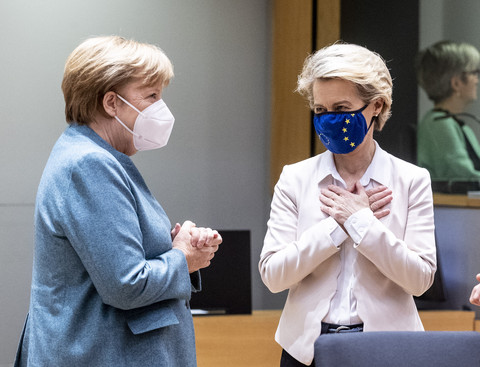[ad_1]

German chancellor Angela Merkel said on Wednesday (21 April) that she is open to treaty changes to better coordinate EU health policy.
“I am always open to treaty change if they make sense, and if they are not a goal in itself,” Merkel said at an online event organised by the centre-right European People’s Party, which includes Merkel’s Christian Democrats (CDU).
“In the area of health Europe needs more powers that may require treaty change,” she said.
Merkel defended the EU’s joint procurement of vaccines saying “it was correct that the EU purchased vaccines together” because separate purchases would have led to tensions in an open-border internal market.
She said many EU countries “would not have had a good chance of purchasing vaccines on their own”, and without the EU purchases there could have been a lot of competition between larger and smaller EU countries.
“I think it is wrong to divide things into black and white, good or bad, success or failure,” Merkel said.
She acknowledged that “we weren’t well prepared enough”. “Sometimes the EU is slower, the commission on its own cannot act, if member states refuse to play along,” she said.
Merkel also said Europe has not treated its pharmaceutical companies “very well”, and they moved to the US, weakening the production capacity of Europe.
She added that Israel couldn’t have been inoculated if Europe has not exported vaccines to the country.
Eastern perspectives
Asked on member states challenging EU values – without naming Poland and Hungary which are entangled in legal and political battles with the bloc – Merkel said “we are standing by our values without compromise”.
She reminded that under Germany’s EU presidency a compromise was reached on linking EU funds to the respect fro the rule of law, a legislation that Poland and Hungary challenged at the European Court of Justice.
“It’s clear the current member states became members for good reason. Now there are majorities in power that don’t implement the values that we expect and there are shortcomings in the legal sphere or in the freedom of press sphere,” she said, adding that there also large parts of the population in those countries that do not agree with their own governments.
Merkel added that the EU also should better take into consideration the different experiences of Eastern European countries during the cold war – which she said is different from the rule of law issue.
“In discussion with eastern European countries, I see that increasingly these countries are becoming more and more confident, and they say we achieved a lot over the last 30 years or so, and they say we want our experiences and opinions to be taken seriously,” she said.
Merkel said these countries don’t necessarily want an “ever-closer union” as – they argue – that for many years they were not able to have their national identity.
“And we can’t say that we, who have been in the EU longer, are the ones who know about freedom and democracy, and we have prepared the path for you, accept it as it is and don’t ask questions,” said Merkel – who herself was born in former East Germany.
Issues to deal with
Merkel said the EU needs to work on its digital strategy, issues of data ownership, data handling, sovereignty, and the digital green certificate for travelling after Covid-19. Merkel also said EU competition law needs to be looked at to be able to unlock European global companies.
The German chancellor, who will leave office in September after 16 years in power, said the EU needs to work “much closer together” in transatlantic relations, and with China, Africa, and Russia.
On dropping unanimity in foreign policy issues, Merkel said the EU needs to “move forward moderately, otherwise, Europe will be divided and each member states will pursue its own foreign policy”.
Merkel urged for more focus on defence, as the EU cannot defend itself without Nato.
Who next?
Merkel will not run in the upcoming German election on 26 September.
While her conservative party was last week mired in infighting about its candidate for chancellor, the Green party for the first time put forward its own candidate – making it clear the party is no longer content simply with the ‘kingmaker’ role.
The 40-year old Annalena Baerbock is a former trampolining ace who studied international law at the London School of Economics, and served as the party’s chair for the last three years – but lacks government experience.
The internal struggle within the CDU-CSU coalition – from which CDU chief Armin Laschet emerged as the candidate – left the alliance bruised with voters.
A Forsa poll released on Tuesday put the Greens in the lead with 28 percent of the vote, up five percentage points from a poll conducted in early April. Support for the CDU-CSU had fallen six points, to 21 percent, the poll showed.
[ad_2]
Source link